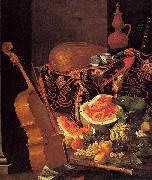China al por mayor de Marco de Oleo |
|||||||||||

|
|||||||||||
|
|
|
||||||||||||||
|
Cristoforo Munari
(July 21, 1667 - June 3, 1720) was an Italian painter of the late-Baroque specializing in still life paintings. He was also known as Cristofano Monari. His initial training was in Reggio Emilia, his birthplace, and he came under the patronage of Rinaldo d'Este, Duke of Modena. In 1703-1706, he lived in Rome, then moved to Florence, where for about a decade he was attached to the court of the Medici. His still life paintings recall those of Evaristo Baschenis; however, the added disarray of porcelain, glass, and foodstuffs, suggest the hangover from the jovial surfeit of the Medici court. He painted also panoplies and war trophies. In 1715 he moved to Pisa where he worked almost exclusively in art restoration; he died in 1720. An exhibition of his paintings took place in 1998 in Reggio Emilia, where it attracted wide attention and was a national success. |
||||||||||||||
|
|
||||||||||||||
|
||||||||||||||
|
|
||||||||||||||
| Cristoforo Munari
(July 21, 1667 - June 3, 1720) was an Italian painter of the late-Baroque specializing in still life paintings. He was also known as Cristofano Monari. His initial training was in Reggio Emilia, his birthplace, and he came under the patronage of Rinaldo d'Este, Duke of Modena. In 1703-1706, he lived in Rome, then moved to Florence, where for about a decade he was attached to the court of the Medici. His still life paintings recall those of Evaristo Baschenis; however, the added disarray of porcelain, glass, and foodstuffs, suggest the hangover from the jovial surfeit of the Medici court. He painted also panoplies and war trophies. In 1715 he moved to Pisa where he worked almost exclusively in art restoration; he died in 1720. An exhibition of his paintings took place in 1998 in Reggio Emilia, where it attracted wide attention and was a national success. Date 17th/18th century ? Medium Oil on canvas cyf |
||||||||||||||
|
Related Paintings to Cristoforo Munari :. |
||||||||||||||
|
|
||||||||||||||
|
|
||||||||||||||
|
CONTACTE EEUU |







